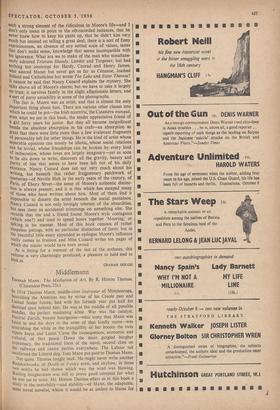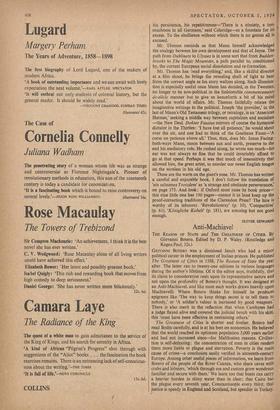Middlemann
THOMAS MANN: The Mediation of Art. By R. Hinton Thomas. (Clarendon Pres, 25s.) 1914 Thomas Mann, middle-class litterateur of Mitteleuropa, bestriding the Americas too by virtue of his Creole past and United States future, had with his fortieth year put half his destined span behind him. He was at the middle of all possible Middles, the perfect mediating artist. War was the catalyst. Neutral Zurich, buxom bourgeoise—what irony that Mann was fated to end his days in the arms of that kindly nurse—was nourishing the while in the tranquillity of her bosom the twin vipers Joyce and Lenin. Came the consequences, economic and cultural, of that peace. Down the drain gurgled burgher supremacy, the traditional form of the novel, second class on the railways and centre parties everywhere. The Labour tail swallowed the Liberal dog. Tom Mann put paid to Thomas Mann.
Not quite. Thomas fought back. He might never write another Buddenhrooks, or Death in Venice even, and anyhow, in those two works he had shown which way the wind was blowing. Rotting burgherdom was still to prove good compost for what he was yet to write. Mr. Hinton Thomas oilers us in this book a study in the mutability—and stability—of Mann, the adaptable, most novel novelist, whom it would be as useless to blame for his persistence, his repetitiveness—There is a nimiety, a too.: muchness in all Germans,' said Coleridge—as a fountain for its excess. To the ebullience without which there is no genius all is excused.
Mr. Thomas reminds us that Mann himself acknowledged the analogy between his own development and that of Joyce. The path from Dubliners to Ulysses is in some sort that from Budden- brooks to The Magic Mountain, a path parallel to, conditioned by, the current European social dissolution and re-formation.
Mr. Thomas has 'read everything,' and, like a skilful director at a film shoot, he brings the revealing shaft of light to bear from the correct angle as his story waltzes along. Such illumina- tion is especially useful once Mann has decided, in the Twenties, no longer to be non-political in the fashionable commencement- de-siecle manner but to give us henceforth a bit of his mind about the world of affairs. Mr. Thomas faithfully relates the imaginative writings to the political. Joseph 'the provider,' in the last of Mann's Old Testament trilogy, or tetralogy, is an 'American Hermes,' seeking a middle way between capitalism and socialism —the New Deal. Doktor Faustus mirrors of course the hysterical dictator in the Thirties: 'I have lost all patience,' he would shout over the air, and one had to think of the Goethean Faust—'A curse on patience above all.' Thus, then, does Mr. Janus Facing- both-ways Mann, moon between sun and earth, preserve to the end his mediatory role. He rushed along, he wrote too much—his ear was not always so fine that he could invariably afford to go at that speed. Perhaps it was that touch of insensitivity that allowed him, the great artist, to murder our sweet English tongue on the wireless in his old age.
These are the warts on the giant's nose. Mr. Thomas has written a careful and enjoyable book. I don't follow his translation of 'ein seltsames Trotzderte as 'a strange and obstinate perseverance,' on page 175. And look : if Oxford must raise its book prices— this nice little one has 190 pages—cannot it at least keep up the proof-correcting traditions of the Clarendon Press? The hire is worthy of its labourer. 'Revolutionray' (p. 10), 'Comparitive' (p. 61), 'Klinigliche Koheit' (p. 181), are amusing but not good enough.
OLIVER EDWARDS



















































 Previous page
Previous page